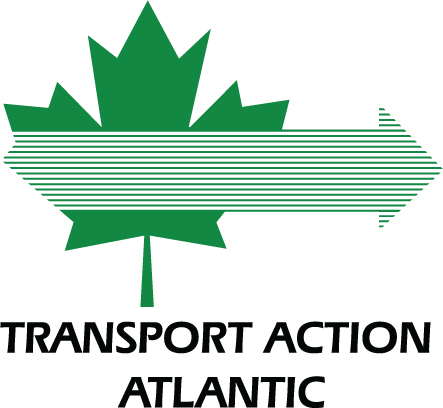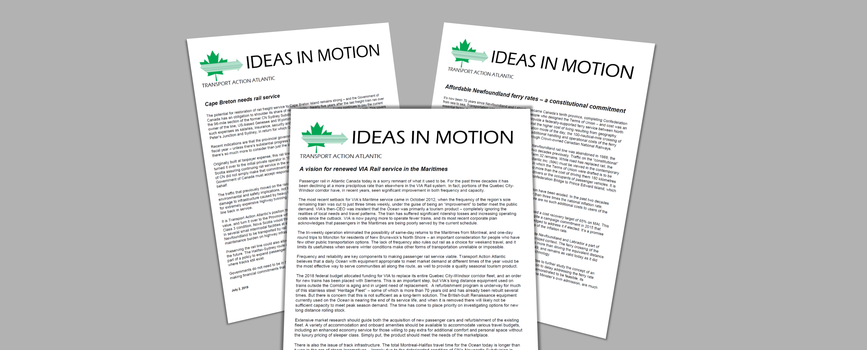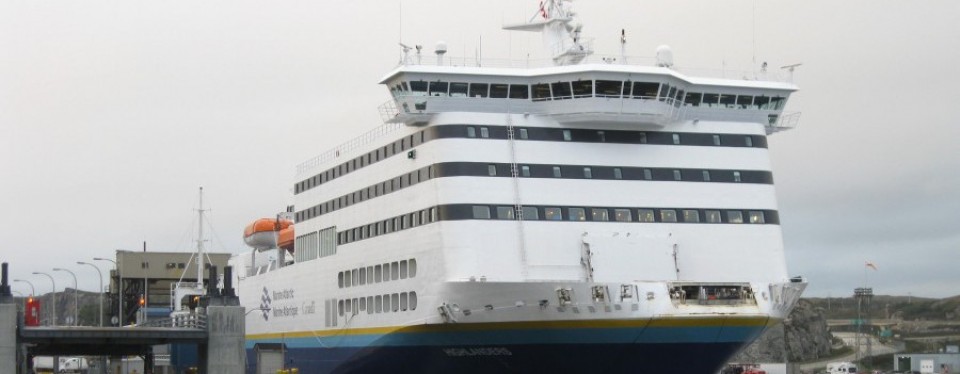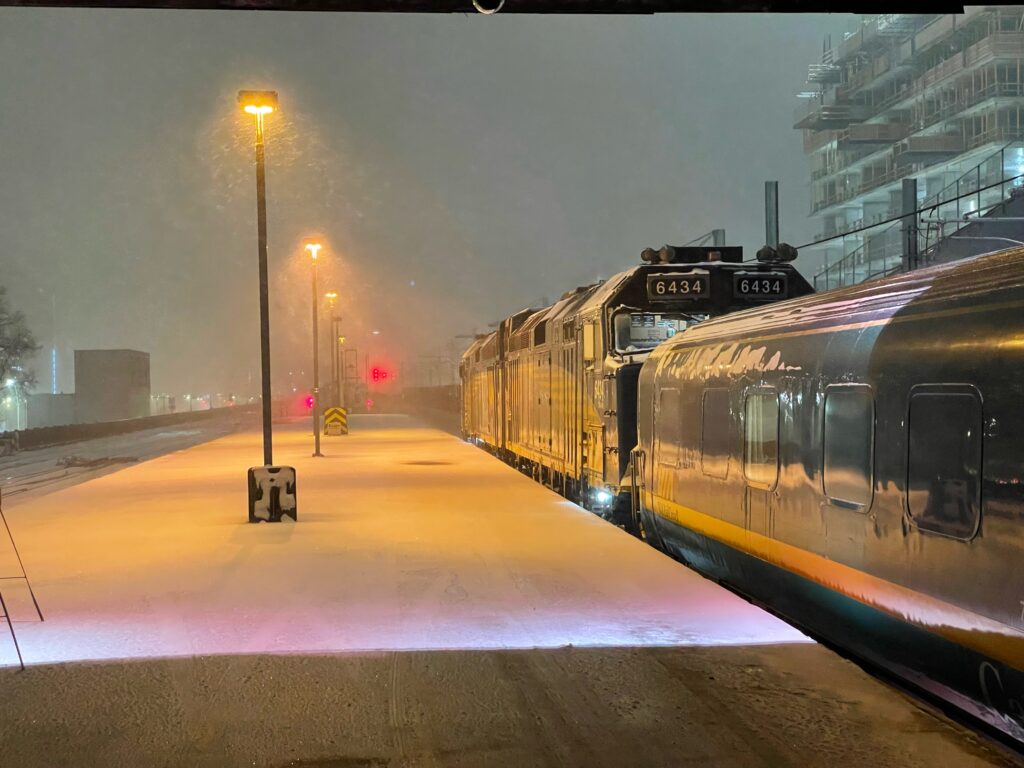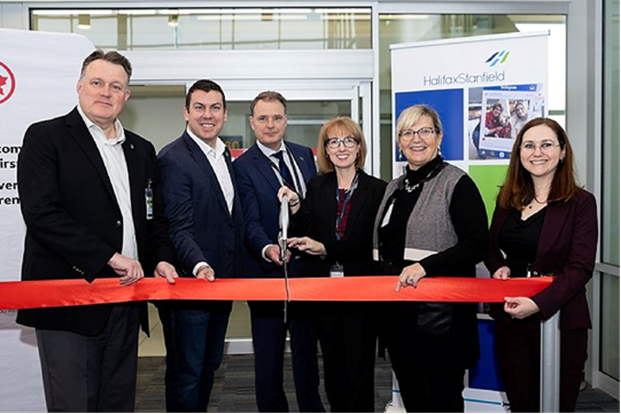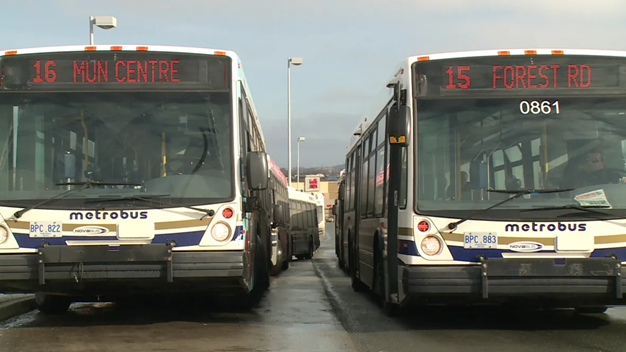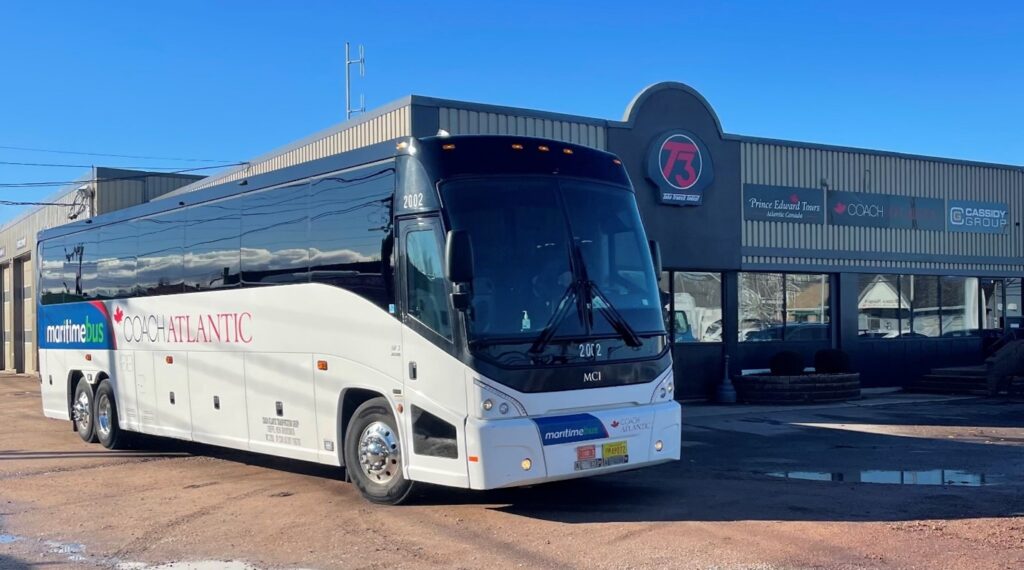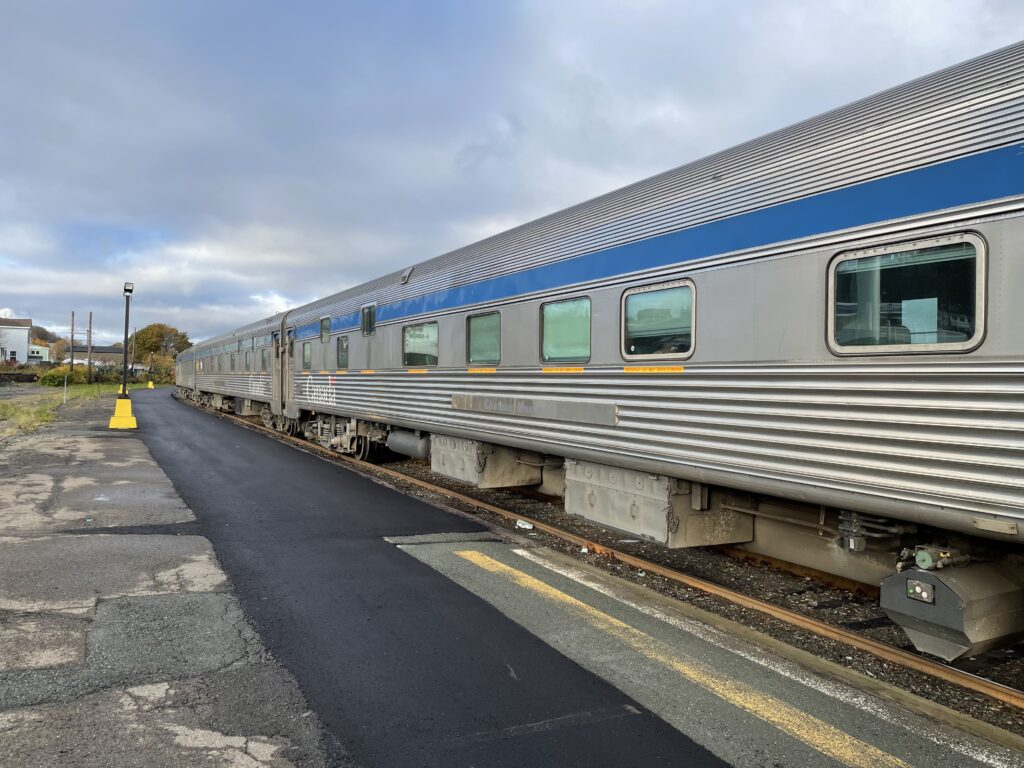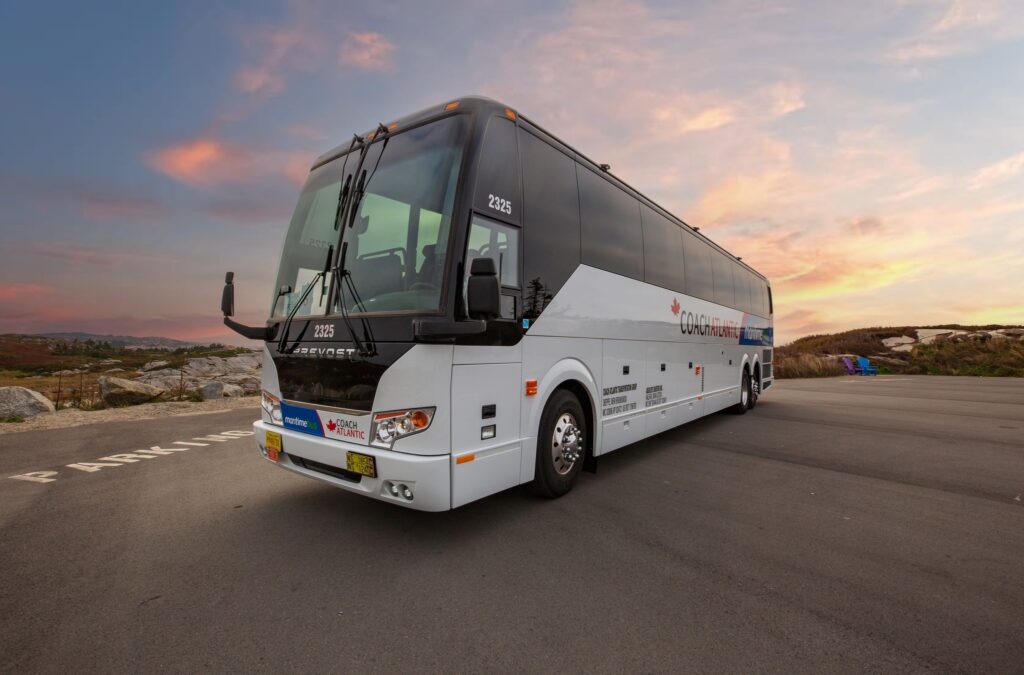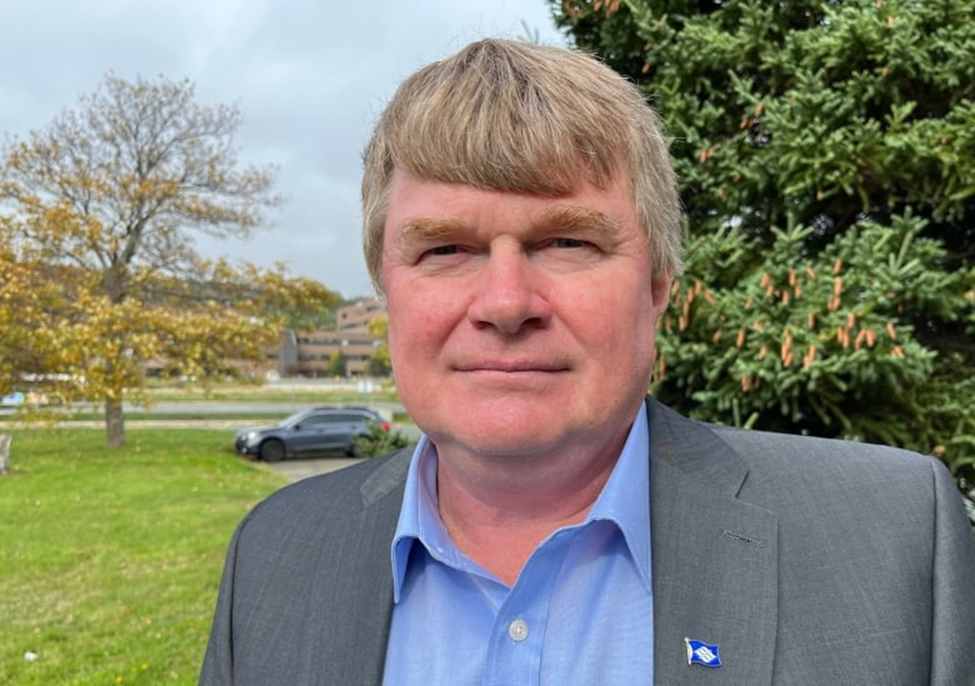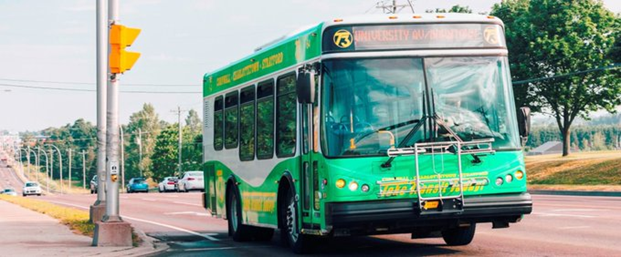Welcome to the (somewhat belated) February Atlantic Transport News.
Here’s a look at what you’ll find in this edition:
- Parliamentary Committee probes VIA’s holiday failures
- VIA takes another step in long-haul renewal process
- No reason for worry about Atlantic transit security
- New Saint John transit service has encouraging start
- Marine Atlantic offers off-season deal
- Porter launches jet service from Halifax
PARLIAMENTARY COMMITTEE PROBES VIA’S HOLIDAY FAILURES
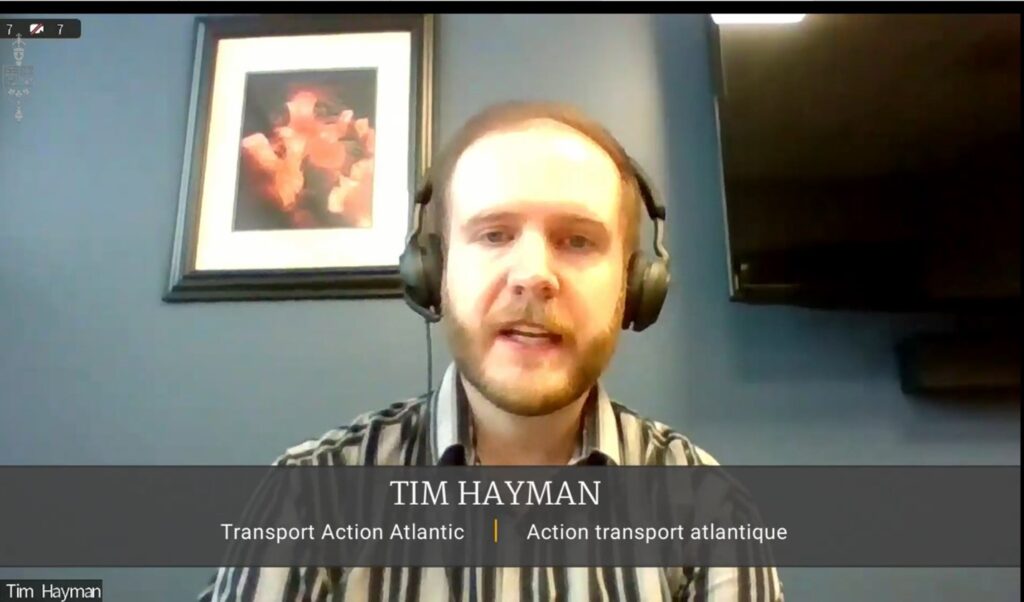
Last month, we reported on the meltdown of VIA Rail services right ahead of Christmas 2022, including issues that left passengers stranded on the Ocean in both directions. TAA President Tim Hayman was one of those affected passengers, and took the opportunity to make a submission on behalf of TAA to the House of Commons Standing Committee on Transport, Infrastructure and Communities. Tim was then invited to appear before the committee on January 26, and took the opportunity to press the committee to look further into the issues that affected VIA’s performance, and identify ways to ensure that passengers aren’t left stranded in similar circumstances in future storms. This followed VIA’s testimony to the committee in the morning, where committee members grilled the Crown corporation on its performance.
You can watch the relevant section of the committee hearing here: https://parlvu.parl.gc.ca/Harmony/en/PowerBrowser/PowerBrowserV2/20230126/-1/38414
There was additional coverage of this issue on CBC’s Maritime Noon, and in interviews with Sackville’s CHFM, both of which you can find at the links below.
CBC Maritime Noon Interview: https://www.cbc.ca/listen/live-radio/1-38-maritime-noon/clip/15962486-the-president-transport-action-atlantic-gives-testimony-house
CHFM Interview: https://www.chmafm.com/welcome/one-advocates-30-hour-ordeal-on-via-rail-and-his-call-for-a-fundamental-shift-in-passenger-rail/
CHFM web story: https://www.chmafm.com/welcome/30-hour-ordeal-on-vias-the-ocean-shines-a-light-on-need-for-fundamental-shift-in-passenger-rail/
VIA TAKES ANOTHER STEP IN LONG-HAUL RENEWAL PROCESS
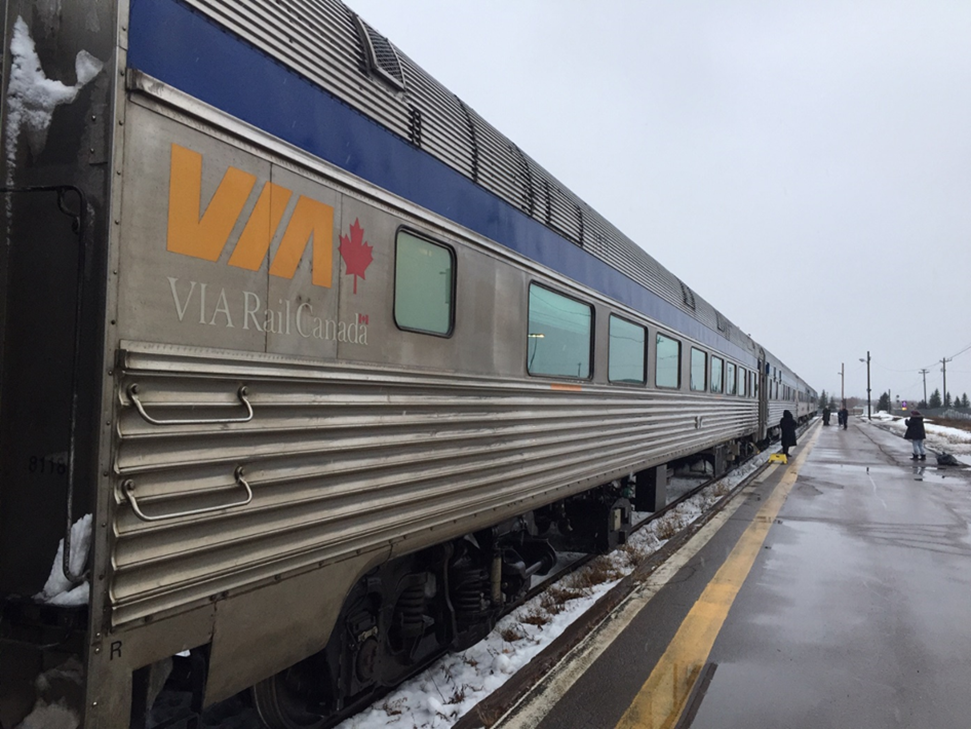
PHOTO – Ted Bartlett
In late January, VIA Rail took another incremental step towards procuring a replacement fleet for the ageing HEP1 and Renaissance equipment. The Crown corporation posted a Request for Information to MERX (the federal procurement platform) for renewal of the long distance, regional, and remote fleet (I.e. non-Corridor HEP/Ren fleet), titled “Notice of Market Consultation – Long Distance Regional and Remote”.
A few notable excerpts:
“VIA Rail intends to renew its existing long distance regional and remote fleet by selecting a supplier to design, manufacture, test, supply, deliver and commission cars and motive power and ancillary equipment (on-board and offboard) with a prescribed capacity of car types (seated coaches, sleeper, diners, multi-purpose, baggage) through an open competitive procurement process (the “Long Distance Regional and Remote Fleet Renewal Project”)”
”VIA Rail will proceed with pre-procurement activities regarding its Long Distance Regional and Remote Fleet Renewal Project. As part of these pre-procurement activities, VIA Rail intends to engage in consultations with motive power and rolling stock manufacturers to solicit feedback on VIA Rail’s proposed technical specifications, maintenance’s scope of work as well as commercial & contractual related terms (collectively the “Technical and Commercial Documents”).”
”Through this consultation, VIA Rail’s objective is to reduce the eventual in-market time ensure requirements clarity by continuing to work with motive power and rolling stock manufacturers through this consultative pre-procurement process to consider market input on both technical and commercial &contractual questions prior to the commencement of a formal procurement process.”
The submission deadline was February 17, 2023. To date, there has been no information about how many or which suppliers responded to the invitation, though VIA had previously held a market day for interested suppliers, which saw a number of interested parties take part. Amtrak is at a similar stage in their own long distance fleet procurement plans, taking the first steps towards a replacement for their Superliner equipment. According to Amtrak, as many as 10 suppliers have expressed interest. They plan to launch a formal procurement process later this year.
The timing of the planned Amtrak and VIA orders could prove beneficial, as the larger potential order makes a very appealing case for a manufacturer to bid with a product that would suit the needs of both operators. For Amtrak, funding is already in place to begin this process; in contrast, VIA’s progression to a formal procurement process (RFQ/RFP and contract award) will of course be dependent on government funding. TAA has made a pre-budget submission to the federal government, with funding for a new VIA long distance fleet as our top priority. With the existing equipment continuing to deteriorate and long lead times for new equipment, VIA needs to be given the go ahead before it’s too late.
NO REASON FOR WORRY ABOUT ATLANTIC TRANSIT SECURITY
…but homelessness issues cause concern
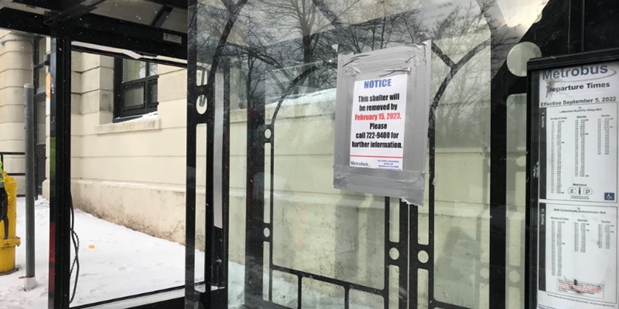
PHOTO VOCM News
Atlantic Canadians have no reason to be unduly concerned about their personal safety and security when riding the region’s public transit systems. That’s the opinion widely shared by both operators and advocates around the region. There’s been a lot of negative publicity lately about ugly and violent incidents on the Toronto Transit Commission’s subways, streetcars and buses, but it would appear to be a trend that’s fortunately confined to the nation’s largest cities.
The biggest issue confronting transit agencies in this part of the country stems from the rising urban problem of homelessness. The matter came to a head in St. John’s in early February, when Metrobus Transit gave notice that it planned to remove two transit shelters in proximity to The Gathering Place, a long-standing agency offering support to those in need, ostensibly because people had been using them for “sleeping rough”.
Two transit users interviewed on Military Road told the Telegram they’d witnessed a situation in which someone had moved into one of the bus shelters. They said the person had covered the exposed areas of the shelter near the ground to keep out the wind, had taped cardboard around the bottom of the shelter, and had laid cardboard on the ground inside, which acted as a barrier from the cold, damp sidewalk.
Reaction to the Metrobus notice was swift and negative, and City Hall promptly ordered a reversal, while launching an initiative to seek less drastic solutions. But it’s a problem that’s not unique to St. John’s. Both Moncton’s Codiac Transpo and Fredericton Transit have been challenged by homeless people taking over shelters while waiting passengers have to stand outside in the weather. Charlene Sharpe, transit manager for Fredericton, says the city police have been fully supportive in dealing with these issues, including removing individuals occupying the shelters. Halifax Transit is also apparently keeping a close eye on the matter, but executive director Dave Reage didn’t want to upstage a report he will be giving to HRM Council in early March, so he declined comment for the time being.
David Brake, head of the Essential Transit Association in St. John’s (and also a TAA board member), expressed concern that negative publicity over safety on buses is over-stated, and could in fact be a key barrier to getting more people to consider using transit. “No Atlantic province has a transit system anything like the TTC, whose safety problems are likely a function both of its scale and of being in a large city,” he says.
Codiac Transpo operations manager Alex Grncarovski agrees wholeheartedly. He brought many years of TTC experience with him to Moncton, and he says the operating environments are really worlds apart. Fredericton’s Charlene Sharpe, who also previously worked for the TTC, holds a similar view.
“I can honestly say there’s no comparison to what’s going on in Toronto, versus the Maritimes.” Mr. Grncarovski says. “Assaults toward employees and customers have always been a problem at the TTC. Security cameras were brought in due to the union local requesting greater protection for employees. This is also the reason operator safety barriers were also installed. Once the cameras were started, the TTC was committed to charge people assaulting employees, to the full letter of the law. They hired people to attend court and encourage the Crown in obtaining fullest punishment towards perpetrators. This could be jail time and or lifetime ban from the system. Their pictures were posted at each location advising employees that if the person seen in the picture is observed attempting to board the system they were to immediately call and request police.”
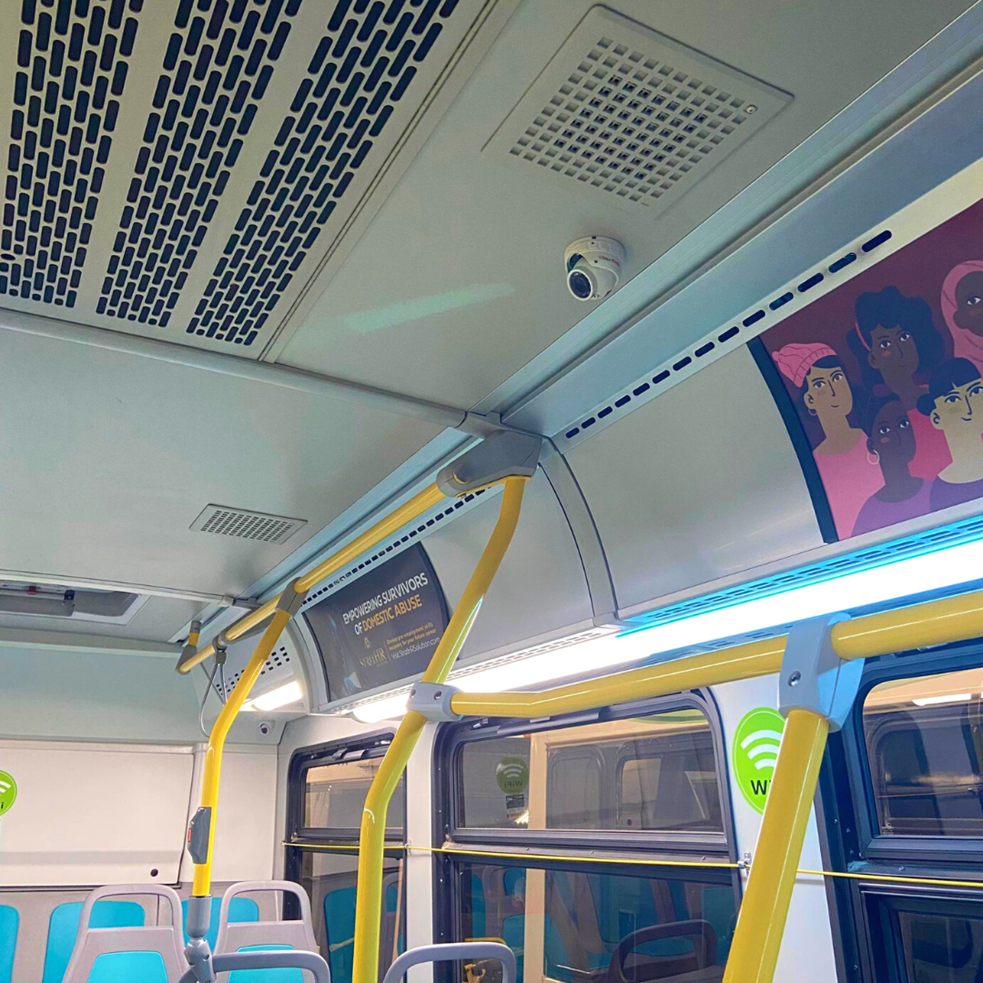
PHOTO Codiac Transpo
Nevertheless, Codiac Transpo is in the process of installing security cameras on board its vehicles, and Fredericton Transit recently completed a similar installation on its entire fleet. “However it was not due to an escalation in violence,” says Charlene Sharpe. “We installed cameras for accidents and incidents in general, as well as part of the new community camera program for the City. It does provide an added assurance to our operators and customers, and is seen more as a preventative measure as there have been very few incidents over the years.”
“CCTV cameras are an increasingly common tool used by public transit to assure the security of customers and employees and we are pleased to see this project go forward,” says Moncton deputy mayor Bryan Butler, who is also a retired police officer. “We appreciate the support we received through the Small Communities Fund. It would be difficult to implement larger-scale improvements in a transit system of our size without that type of assistance.” Installation on the entire Codiac Transpo fleet is expected to be complete by year-end.
-Ted Bartlett
NEW SAINT JOHN TRANSIT SERVICE HAS ENCOURAGING START
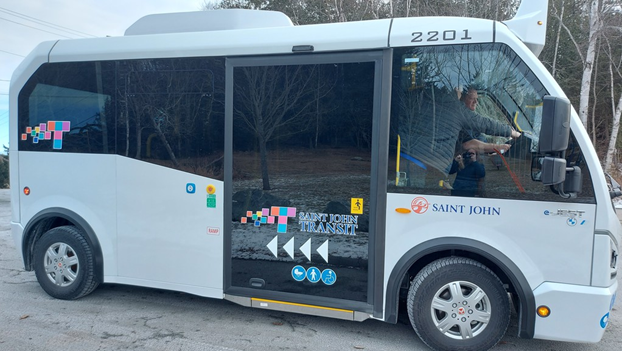
A new concept aimed at bringing improved and expanded service to lightly-used routes was launched by Saint John Transit on January 9 – and from all appearances it’s off to a great start. FLEX is an on-demand service that goes to stops where it’s requested within a zone, instead of following a fixed route. For example, the new West FLEX zone includes all areas previously covered by fixed routes 13 and 14, covers a wider area than the former full-sized bus service, and operates for longer hours.
Riders can schedule a bus pickup at their nearest transit stop either by using a smartphone app or simply calling Saint John Transit. Nearly 1500 people gave the new concept a try during its first month up to February 9, transit director Ian MacKinnon told the Telegraph Journal. That works out to an average of about 55 people a day. He said 455 customers had already downloaded the app.
Transit planners believe that FLEX will deliver better service for riders by allowing them to travel when they want. This service is currently available all day Monday to Friday from 6:30 am to 6:30 pm, as well as from 10:00 am until 6:00 pm on Saturdays. The intent is to provide service within half an hour of a rider’s request.
Saint John Transit conducted a successful pilot of an electric Karzan Jest bus last summer on various routes. Six of these late model, 20-passenger buses have been leased for the FLEX service, and the city has an option to purchase the vehicles if the initiative proves successful.
MARINE ATLANTIC OFFERS TRAVELLERS OFF-SEASON DEAL
No general rate increase has yet been announced for 2023

There’s nothing official, but it appears as if users of the Marine Atlantic ferry between Newfoundland and Nova Scotia may not be facing a rate increase in 2023 – and there’s some good news for off-season travellers this spring. The Crown corporation has been under standing orders from Transport Canada to achieve 65% cost recovery, but it appears that the growing pushback against this demand may be having some effect on the political masters in Ottawa. In past years there was typically an announcement about rates in January or February, just prior to the start of the federal government’s new fiscal year. So far in 2023 there’s been nothing.
Transport Minister Omar Alghabra made much ado about providing federal funding to eliminate the expected toll increase on the Confederation Bridge this year, but there’s been no similar mention of the ferry crossing to Newfoundland – even though the minister met recently with his provincial counterpart in St. John’s. Both the bridge and the ferry are constitutional obligations of the Government of Canada. This may mean that the cost recovery requirement for Marine Atlantic has been quietly placed in abeyance for another year; it almost certainly does not mean that it has been shelved permanently.
Transport Action Atlantic has been at the forefront of a campaign to have ferry rates reduced to be consistent with what is widely believed to be the intent of the 1949 Terms of Union under which Newfoundland became the 10th Canadian province – namely that the cost of moving people and goods across the Cabot Strait should be equal to that of land transportation over the same distance. While in opposition, Justin Trudeau castigated the Harper Conservatives for imposing the 65% cost recovery demand on the ferry service, but since gaining office in 2015 the Liberals have done nothing to change the policy.
But for now the good news is that passengers travelling between Port aux Basques and North Sydney – along with their vehicles – will be eligible for a 25% fare reduction for travel until June 30. Apart from being applicable to new bookings only, there are relatively few restrictions on this off-peak incentive. It even applies to the first seven sailings on the seasonal service between North Sydney and Argentia. Customers have until midnight on April 5 to make reservations under this promotion.
It would appear that Marine Atlantic is offering the discount deal to maximize revenue during a period when it typically has excess capacity. It’s the second such discount incentive offered in recent months, the last one being the “Black Friday” sale which covered travel during the late fall and early winter, including the Christmas-New Year holiday period. This time, however, it extends over a longer time period, and the booking window is much wider.
PORTER LAUNCHES JET SERVICE FROM HALIFAX TO PEARSON
New Charlottetown-Ottawa service also announced

Another domestic travel option is now being offered from Halifax Stanfield International Airport. Porter Airlines introduced a new direct service to and from Toronto Pearson, using its new 132-seat Embraer E195-E2 aircraft on February 23. The airline officially took delivery of the first two of a planned 50 medium-range jets from the Brazilian manufacturer in December, becoming the first North American carrier to fly this model. Porter has chosen to configure the cabin with 132 seats – 14 fewer than the maximum the plane is designed for. In addition to more personal space, the airline claims this aircraft will offer every passenger an elevated economy experience that includes no middle seats, complimentary beer and wine served in real glassware, a selection of premium snacks, and free, fast wifi.
Meanwhile, Porter has just announced the addition of another Atlantic Canada city to its expanding service map. It will be launching direct service between Ottawa and Charlottetown as of May 17.
The new daily, non-stop route is to be served by the tried-and-true 78-seat Q-400 turboprop aircraft.
“Porter is continuing to invest in regional flying across Eastern Canada,” said Kevin Jackson, executive vice president and chief commercial officer. “Charlottetown is an entirely new destination for us and the addition of Prince Edward Island means that Porter is serving every Atlantic Canada province for the first time.” Porter is already flies to Moncton, Fredericton, Halifax and St. John’s
“We are thrilled to welcome Porter Airlines to YYG and Prince Edward Island,” said Charlottetown Airport CEO Doug Newson, “Islanders and visitors alike have been requesting Porter for many years, so it is extremely rewarding for us to be able to announce this today. This new non-stop service to Ottawa will not only provide convenient access to the nation’s capital, but will also allow travellers the opportunity to connect to Porter’s expanding network at Ottawa International Airport.”
